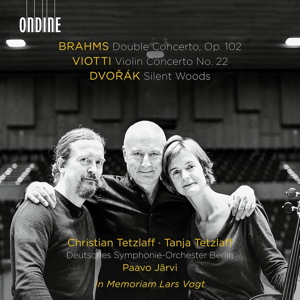
Johannes Brahms (1833-1897)
Double concerto for violin and cello in A minor Op.102
Giovanni Viotti (1755-1824)
Violin Concerto No.22 in A minor (W22/G.97)
Antonín Dvořák (1841-1904)
Silent Woods (“Waldesruhe”) for cello and orchestra Op.68 No.5
Christian Tetzlaff (violin), Tanja Tetzlaff (cello), Deutsches Symphonie-Orchester Berlin/Paavo Järvi
rec. 2022, Haus des Rundfunks & Großer Sendesaal, Berlin, Germany
Reviewed as a digital download from a press preview
Ondine ODE1423-2 [60]
Recordings such as this are tricky to review. Is it a special case (in this instance, a memorial to dearly loved colleague and friend who died prematurely)? Or is it just another release in a catalogue already bursting at the seams? And, if the former, do the unique circumstances (as, say, Furtwängler conducting Beethoven Ninth at the post-war reopening of Bayreuth) add something special musically to the recording?
Lars Vogt’s death from cancer in 2022 robbed the Tetzlaff siblings of a friend and chamber music partner. Much of their studio work together sits high on the lists of recommended recordings. A swan-song recording, of Schubert appropriately enough, was released earlier in the year (review). This recording marks Vogt’s absence formally. Experience in chamber music, lots of it at the highest level, is a necessary quality for a successful performance of Brahms’s trickiest concerto. This is the Brahms of the late chamber music and those strange sphinx-like piano pieces. Never mind the odd combination of solo instruments, this is the least flashy of concertos. Even so, it requires soloists at the top of their game to pull it off. In other words, it needs seasoned concerto players who are also fully versed in the art of chamber music playing. Step forward, Tanja and Christian Tetzlaff.
According to the liner notes, they have played this seldom loved piece a lot, and you can tell. Their swiftish tempo for the slow movement avoids rush by the natural flexibility and spontaneity of their give and take. This does sound like an intimate conversation – even down to some petulance from the cello. Grumpy old Brahms picks a fight with his old mate Joachim before reconciling, and what a reconciliation: it sounds like a blazing Autumn sunrise.
If there is a weak link, and this is relative to the soloists’ exalted level, it is that Paavo Järvi’s direction is a little ordinary. Not bad at all but a bit conventional, it sounds like a regional band putting in a shift in the first movement’s first big tutti. The orchestra play with mellow attentiveness but the conducting lacks the last ounce of dynamism which the brother and sister bring to their parts.
I found the Viotti coupling less convincing, despite Brahms’s love of this concerto and his inclusion of motives from it in the Double Concerto. The style is poorly matched to the other works on the programme. For all Brahms’s enthusiasm for the piece, I have always found it rather empty and a bit rambling in way that even Tetzlaff’s and Järvi’s advocacy cannot rectify. Fans of the piece can approach this recording without fear but it seemed to me to take an otherwise recommendable disc out of contention.
In many ways, the most moving aspect of this tribute comes with the warm simplicity of Dvořák’s Silent Woods. This feels a little like the planting of a tree in Vogt’s memory. Tetzlaff’s playing is appropriately inward, and the final pages bring a chamber-music quality of introspection that feels most appropriate.
This is a flawed but touching tribute by elite musicians to a friend who was one of their own. In many ways, it can be only be judged in those terms – as a unique event. Admirers of those musicians can be reassured that it is a great success. Everyone else can hear the Brahms and the Dvořák, but there is no getting around the fact that the Viotti feels like a bit of a cuckoo in the nest.
David McDade
Help us financially by purchasing from




















